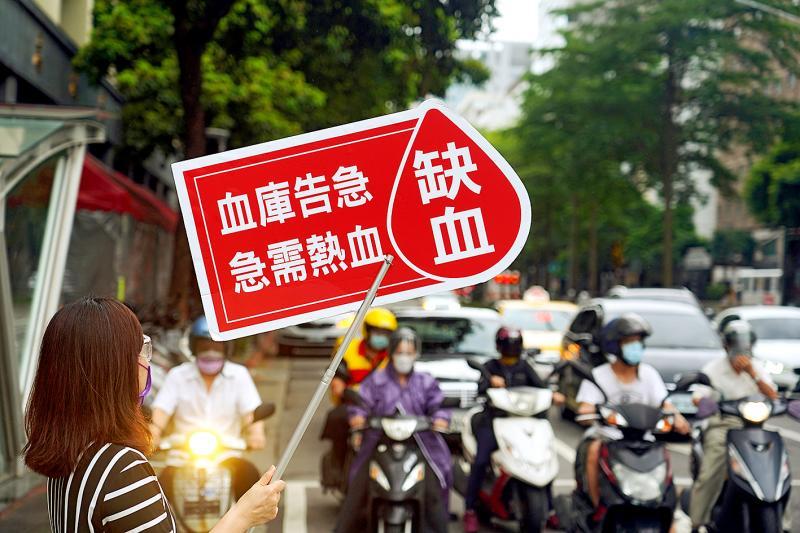A Taiwanese national who consumed cannabis gummies in Thailand has been permanently barred from donating blood in Taiwan, as cannabis remains a Category 2 narcotic in the country, the Food and Drug Administration (FDA) said yesterday.
The person, whose gender was not revealed, recently shared their experience on the social media platform Threads, saying that they tried cannabis gummies out of curiosity while visiting Thailand last year and did not expect it would result in a permanent blood donation ban, the Chinese-language media outlet CTWANT said on Monday.

Photo: CNA
Asked how the blood donation center found out about the cannabis use, the person, expressing regret over their consumption of cannabis, said that donors are asked about their medical history and any past narcotic use before giving blood, to which they "answered honestly," the report said.
"I thought using cannabis would only bar me from donating blood for a year or two ... but since cannabis is illegal in Taiwan, the law assumes there is a risk of addiction or repeat use, so I was marked as permanently ineligible for blood donation," the report said.
In response to public discussion sparked by the Threads post regarding Taiwan's blood donation criteria, FDA Deputy Director-General Wang Der-yuan (王德原) yesterday said that the decision was based on the nation's blood donor health regulations.
Under Article 5, Paragraph 3 of the regulations, people with a history of narcotic use are permanently barred from donating blood.
The Narcotics Hazard Prevention Act (毒品危害防制條例) stipulates that narcotics can be divided into four categories based on "their extent of causing habitual usage, abusive usage and danger to society."
Cannabis, along with substances such as opium poppy and amphetamines, is classified as a Category 2 narcotic under the act.
It contains more than 65 unique alkaloid compounds, with the two primary ones being tetrahydrocannabinol (THC) and cannabidiol (CBD), the Ministry of Justice Investigation Bureau said in a news release last year.
"THC affects the human central nervous system and may lead to physical dependence and related psychiatric disorders. As a result, both cannabis and THC are classified as Category 2 narcotics under the Narcotics Hazard Prevention Act," the release read.
In Taiwan, any product containing more than 10 parts per million (ppm) of THC is classified as a Category 2 narcotic, Wang said.
In contrast, the Washington State Liquor and Cannabis Board stipulates that THC concentration in edibles is measured in milligrams, with each serving limited to a maximum of 10mg of THC — a typical amount found in legally sold cannabis gummies in the US.
Assuming a cannabis gummy weighs about 5g and contains 5mg of THC, its concentration would then be about 1,000ppm, far exceeding Taiwan's legal threshold of 10ppm.

Three Taiwanese airlines have prohibited passengers from packing Bluetooth earbuds and their charger cases in checked luggage. EVA Air and Uni Air said that Bluetooth earbuds and charger cases are categorized as portable electronic devices, which should be switched off if they are placed in checked luggage based on international aviation safety regulations. They must not be in standby or sleep mode. However, as charging would continue when earbuds are placed in the charger cases, which would contravene international aviation regulations, their cases must be carried as hand luggage, they said. Tigerair Taiwan said that earbud charger cases are equipped

Foreign travelers entering Taiwan on a short layover via Taiwan Taoyuan International Airport are receiving NT$600 gift vouchers from yesterday, the Tourism Administration said, adding that it hopes the incentive would boost tourism consumption at the airport. The program, which allows travelers holding non-Taiwan passports who enter the country during a layover of up to 24 hours to claim a voucher, aims to promote attractions at the airport, the agency said in a statement on Friday. To participate, travelers must sign up on the campaign Web site, the agency said. They can then present their passport and boarding pass for their connecting international

WEATHER Typhoon forming: CWA A tropical depression is expected to form into a typhoon as early as today, the Central Weather Administration (CWA) said yesterday, adding that the storm’s path remains uncertain. Before the weekend, it would move toward the Philippines, the agency said. Some time around Monday next week, it might reach a turning point, either veering north toward waters east of Taiwan or continuing westward across the Philippines, the CWA said. Meanwhile, the eye of Typhoon Kalmaegi was 1,310km south-southeast of Oluanpi (鵝鑾鼻), Taiwan’s southernmost point, as of 2am yesterday, it said. The storm is forecast to move through central

The age requirement for commercial pilots and airline transport pilots is to be lowered by two years, to 18 and 21 years respectively, to expand the pool of pilots in accordance with international standards, the Ministry of Transportation and Communications announced today. The changes are part of amendments to articles 93, 119 and 121 of the Regulations Governing Licenses and Ratings for Airmen (航空人員檢定給證管理規則). The amendments take into account age requirements for aviation personnel certification in the Convention on International Civil Aviation and EU’s aviation safety regulations, as well as the practical needs of managing aviation personnel licensing, the ministry said. The ministry